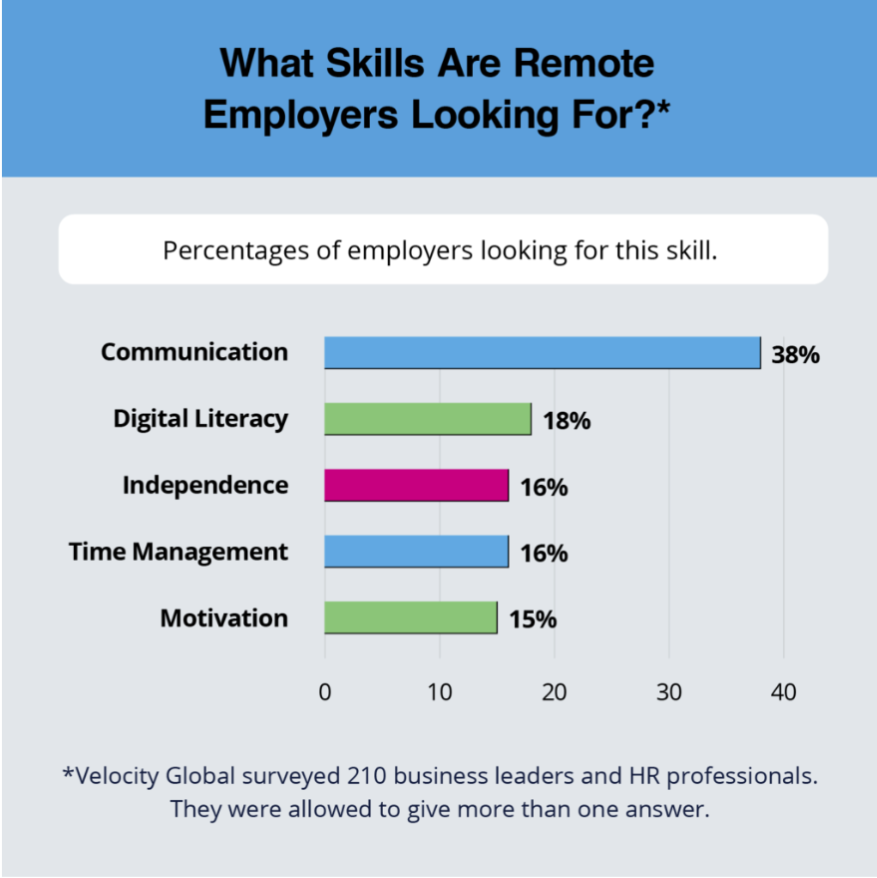Nowadays, many businesses worldwide know the importance of hiring remote workers. Remote employees are often more flexible, hardworking, and productive than on-site employees. In fact, post-pandemic, many organizations have gone fully remote due to the numerous benefits it offers.
However, this situation can be challenging for your recruiters. Although the duties and responsibilities of both remote and on-site workers are often similar, remote employees must exhibit a distinct set of additional skills in order to thrive in a corporate environment.
Choosing the right remote employees can result in substantial cost savings and a boost in your team’s productivity. However, if you end up with the wrong person, it can negatively affect your team’s stress levels and morale.
So, let’s see some of the essential skills remote employees must demonstrate in their day-to-day work.
1. Communication
Effective communication is the cornerstone of a successful remote strategy. It allows managers to set clear expectations and ensure that all team members understand what’s expected of them. This is important since, according to this Owl report, 34% of the managers think communication is one of the top concerns in managing remote employees.
Regular communication enables you to deliver timely updates to your teammates and share industry-specific knowledge, which drives the project’s success. It also mitigates isolation issues, which is extremely important for remote workers. As per Harvard Business Review, remote workers often feel more left out and ganged up on than their on-site colleagues.
Lastly, as per the above Owl report, 64% of employees feel overwhelmed when it comes to communication tools. Therefore, recruiters need to make sure that the selected employees know how to operate remote communication tools such as Teams and Slack.
Furthermore, they should understand which tools are appropriate for particular situations. For example, emails can be used for sharing non-sensitive information. Voice Calls/video calls are useful for handling complex situations that need clarity; teams/slack can be used for urgent communication; etc.
2. Self-motivationSince they often work in an isolated environment, remote employees need to be highly self-motivated and disciplined. They should be adept at managing their schedule/task list, handling their deadlines, and working independently without constant oversight from their team.
Of course, if done correctly, remote working can be a great motivator for productivity. As per this research, 45% of the employees felt more productive when they worked remotely. Furthermore, the research also found that remote workers tended to take fewer days off.
But here’s the thing. Your employees should not see remote work as a free pass to slack off. Rather, they should view it as an opportunity to improve their productivity and showcase their commitment to the organization.
Remote employees should be highly productive and accountable for their work. This means no procrastination on essential tasks and maintaining focus on the required task list without external pressure from their manager or company.

3. Adaptability
As per this report by Statista (post 2020), some of the most essential traits employers look for in potential employees are adaptability and flexibility, followed by technical savvy.
Employees who work in a remote setting should understand that they might face unseen challenges while carrying out their responsibilities. That’s why recruiters should always hire remote workers who stay positive and possess the ability to handle unforeseen challenges on their job.
Furthermore, remote employees should be able to take criticism from their teammates and strive to improve themselves every chance they get. They should also be responsible and should adhere to deadlines strictly.
4. Time management
One of the most important qualities that you should look out for while hiring a remote e employee is time management. The ability to prioritize tasks, handle multiple responsibilities, and maintain an organized task list is of supreme importance in the corporate world.
This report shows that even though labor is the biggest cost for businesses, they are not able to utilize it efficiently. Often, employees are made to work on repetitive, low to no-value tasks, and these tasks can sometimes take up 51% of employees’ working hours. In such situations, time management is very important.
It becomes even more crucial in remote technical roles, where employees must shuffle multiple tasks simultaneously. Remote workers should demonstrate a high level of efficiency and should be able to prioritize critical commitments.
Lastly, as recruiters, you should always measure the productivity of remote employees in terms of the number of tasks that they undertake and complete rather than the hours they log in the system.
5. Tech Savvy
Remote workers should be tech savvy, i.e., they should be comfortable using new tools and technology for their role. This is especially important if your organization implements new tools to improve business processes.
As a recruiter, it’s your responsibility to interview potential candidates on their proficiency in handling new software/tools while hiring. This is not just for remote technical roles but for all workers in an office setting.
Lastly, your selected candidate should be able to use online collaboration tools/whiteboards such as weje.io since such tools allow managers to manage horizontal teams through workflows and task lists. Employees can also use such platforms to provide timely updates to management and track workflow of their colleagues.
Using tools such as applicant tracking systems and recruiting agency crm can help recruiters a lot in organizing different aspects of recruiting such as sourcing candidates, comparing their skill sets side-by-side, and advancing them through the hiring process.
Conclusion
As many studies have mentioned, remote work is here to stay. As per Upwork, 36.2 million Americans will work remotely by 2025. Even in a post-pandemic era, the number of remote jobs will continue to rise.
Hiring employees for a remote role is far more specialized than hiring for an on-site role. Recruiters hiring for remote roles face many additional challenges. They are not only responsible for fulfilling the hiring manager’s requirement, but they must also ensure that the selected employee is qualified and skilled enough to work in a remote environment.
Published: November 15, 2023





